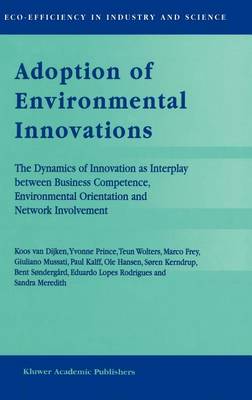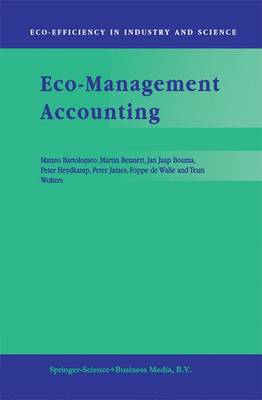Eco-Efficiency in Industry and Science
2 primary works
Book 2
Adoption of Environmental Innovations
by Koos Van Dijken, Eduardo Lopes Rodrigues, Sandra Meredith, Yvonne Prince, T. J. Wolters, Marco Frey, Giuliano Mussati, Paul Kalff, Ole Hansen, and Soren Kerndrup
Published 30 June 1999
How do small and medium sized enterprises (SMEs) adopt environmental innovations? Do they have the necessary internal competence? Is any support offered by external parties (i.e. network involvement)? What are the policy implications? This book is based on extensive fieldwork, conducted in four traditional industrial sectors: offset printing, electroplating, textile finishing, and industrial painting. The work was carried out in Denmark, Italy, the Netherlands, Portugal and the UK. Twenty company-based case studies were analyzed and a telephone survey was conducted among 527 companies. As a result, the Innovation Triangle came to be formulated, which is presented here, defining and combining the determinants of SME innovativeness. The Innovation Triangle distinguishes three major determinants of innovativeness: business competence, environmental orientation, and network involvement. The Innovation Triangle allows one to diagnose current environmental and innovation policies, indicating which policy measures might be effective in increasing the adoption of environmentally friendly technologies, allowing environmental objectives to be achieved.
Book 3
Eco-Management Accounting
by Matteo Bartolomeo, M.D. Bennett, J.J. Bouma, Peter Heydkamp, Peter James, F.B. de Walle, and T. J. Wolters
Published 31 July 1999
The ECOMAC project (Eco-management Accounting as a Tool of Environmental Man agement) has provided a framework for linking environmental management with man agement accounting. It was funded in Theme 4, 'Human Dimensions of Environmental Change' in the EU Environment and Climate Research Programme. The project is of high policy relevance by contributing to the on-going debate on eco management accounting, reporting and indicators. It is also an area needing further re search. I would like to thank the research team, companies that participated as associated con tractors, and the advisory panel. Jonathan Parker DG XII/D-5, European Commission Theme on Human Dimensions of Environmental Change 7 Preface The ECOMAC project This document is the final report on the project 'Eco-management accounting as a tool of environmental managemenf (ECOMAC). This research project was conducted under the Environment and Climate Programme (Human Dimension of Environmental Change) of the European Commission (DG XII). The ECOMAC project investigated how companies are using or intend to use environ mental costs and benefits figures in support of their decisions, and what they have been doing to remedy the limitations of conventional management accounting in this area. The research was largely explorative in nature, but the project also produced a structured overview of the subject and made suggestions and recommendations as to how compa nies could improve their own environmental accounting.

